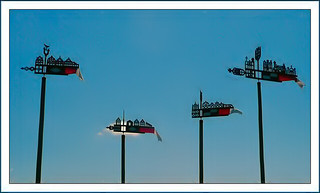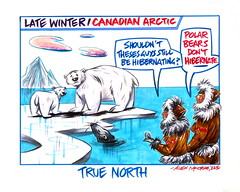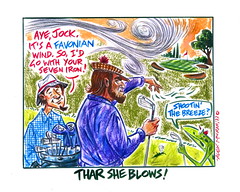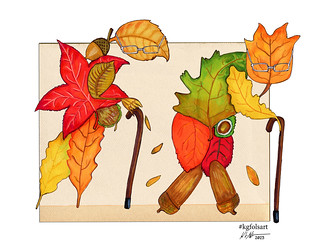|
Home
|
Jun 11, 2023
This week’s themeWeather & climate This week’s words barometer favonian autumnal weather vane hibernal How popular are they? Relative usage over time AWADmail archives Index Next week’s theme Double-duty words keeps on giving, all year long: A gift subscription of A.Word.A.Day or the gift of books AWADmail Issue 1093A Compendium of Feedback on the Words in A.Word.A.Day and Other Tidbits about Words and LanguageSponsor’s Message: A boom-boom boomer gift. OLD’S COOL fits wicked smart fathers to a Tee. Free shipping. Dadnabbit > From: Anu Garg (words at wordsmith.org) Subject: Interesting stories from the Net AI Has Brought Back 15 Languages People Haven’t Heard for Centuries. Here’s What They Sound Like. Upworthy Permalink A Brief History of Insults (and So’s Your Mother) The New York Times Permalink From: Glenn Glazer (glenn.glazer gmail.com) Subject: barometer I cannot think about barometers without thinking about the barometer question. Glenn Glazer, Felton, California
Email of the Week brought to you buy OLD’S COOL -- fits gifted dads to a Tee.
From: Richard S. Russell (RichardSRussell tds.net) Subject: Re: A.Word.A.Day--barometer You wrote: “Weather is not the same as climate. One is short-term fluctuations, the other long-term trends. Denialists fail to acknowledge the long term.” On some of the public-discussion forums I frequent, I’ve found it necessary to go on about this at somewhat greater length: Oh, for goodness sake. I can’t believe that, this deep into the 21st Century, we still have people who apparently don’t understand the difference between weather and climate. Here’s the deal:
Richard S. Russell, Madison, Wisconsin From: Gary Muldoon (gmuldoon0527 gmail.com) Subject: Barometer You mentioned that weather is not the same as climate. A law professor, Paul Freund, once said that the US Supreme Court “should never be influenced by the weather of the day but inevitably they will be influenced by the climate of the era.” Gary Muldoon, Rochester, New York From: Robert Mac (robertmac.com gmail.com) Subject: Climate crisis I’m part of a fellowship which uses humor to make the climate crisis less daunting. Here’s a sample (video, 3 min.). Robert Mac, Washington, DC From: Richard Derus (rrmdd yahoo.com) Subject: Re: A.Word.A.Day--favonian
THOUGHT FOR TODAY: There are two kinds of fools: One says, “This is old, therefore it is good”; the other says, “This is new, therefore it is better.” -William R. Inge, clergyman, scholar, and author (6 Jun 1860-1954) William R. Inge, source of this cleverly formulated truism, was a deeply unpleasant and highly conservative (but I repeat myself) Anglican priest who looked down on women getting the right to vote, on the provision of social welfare, and indeed on the very idea of democracy. He dismissed the latter with the witheringly judgmental statement, “Human beings are born unequal, and the only persons who have a right to govern their neighbors are those who are competent to do so.” Richard Derus, Long Beach, New York From: Bryan Todd (bryansink yahoo.com) Subject: Re: A.Word.A.Day--favonian Re: the THOUGHT FOR TODAY. If you want a helpful rule of thumb concerning the age of things, try the Lindy Effect. If, for example, Pride and Prejudice has been in print for 200 years, it’s a safe bet it will still be in print 200 years from now. And why has it endured? That’s worth discovering. Bryan Todd, Lincoln, Nebraska  Photo: Peter Jennings
Subject: Weather vanes As so often happens when I read AWAD, the word triggers memories and images from my travels. The weather vanes of Nida, Lithuania have to be the most artistic examples to be seen. Traditionally, the weather vanes were mounted on the masts of fishing boats to identify their village and hence their defined fishing grounds off the Curonian Spit. Naturally this led to competition among the fishermen to create the most beautiful weather vane. Today they are mounted around the village of Nida. The largest weather vane I have seen is the Douglas DC-3 mounted on a pivot at the Whitehorse, Yukon, airport. Even a gentle breeze will turn it. Peter Jennings, St. Catharines, Canada From: Debbie Evans (kiwidebbieevans outlook.com) Subject: Weather vane In politics, swing districts in Parliament can be referred to as weather vane seats. In this instance the term seems to refer to both the changeability of the seat and the fact that it acts as an indicator pointing to the overall election outcome. Debbie Evans, Wellington, New Zealand From: Bob Gordon (bob34g gmail.com) Subject: Weather vane Canadian PM William Lyon Mackenzie King, Canada’s most unctuously malleable leader, was famous for saying, “Conscription if necessary, but not necessarily conscription.” Canadian historian and humourist Will Ferguson describes him as a man who “had a weather vane where most people had a heart.” Of the same PM, British High Commissioner to Canada Sir Francis Floud wrote, “My wife says after a conversation with him she feels as if the cat had licked her all over and she ought to go and have a bath.” Bob Gordon, Brantford, Canada From: Sarah Ingram (sarah.ingram wvt.nhs.uk) Subject: hibernal The French word for winter is hiver. I always liked this because it was so close to shiver. Sarah Ingram, Hereford, UK From: Bruce Floyd (brucefloyd bellsouth.net) Subject: autumnal “Harvest comes from the Old English word for autumn, haerfest, and means to reap, gather, and store what has been grown. The season is associated with abundance and joy as it is the culmination of hard work.” (Bountiful Acres) We live in a world of process. Most of us live our lives where we see four seasons come and go. We also can talk of the seasons in a metaphorical sense. For example, in the song “It Was a Very Good Year” Frank Sinatra intones that “now the days are short,” that he’s “in the autumn of the year.” The lyrics that complete the last stanza or verse all imply a sense of richness, completion, fecundity, ripeness, hinting at achieved wisdom. The “fine old kegs are full.” The song manifests an acceptance of process, which, of course, we all know must end in winter, which in our minds is synonymous with death. Can one come to a philosophical understanding of how a human life is controlled by process? I’ve always thought John Keats’ poem “To Autumn” is not only, as some say, the best short poem in the language but also reveals him working his way to acceptance of our inevitable and inexorable movement through time. In his “Ode to a Nightingale”, he finds himself sitting in a chair under a plum tree. He hears the song of the nightingale. Having just buried his younger brother, thus facing the grief of life, he longs to “Fade far away, dissolve, and quite forget” what the nightingale has never known. What knows the nightingale, a thousand years of nightingales, all singing the same sweet and evocative song? What does nature, devoid of humankind, know of “The weariness, the fever, and the fret,” of a place “where men sit and hear each other groan?” Oh, what does the nightingale singing amain in the forest know of a world “Where youth grows pale, and specter-thin, and dies; / Where but to think is to be full of sorrows.” He imagines himself in the “embalmed darkness”. He admits he has been “half in love with easeful death”. He thinks “Now more than ever seems rich to die.” But he realizes that were he dead, he’d no more hear the melodic song of the bird. He understands that the bird “wast not born for death.” In short, a nightingale, no matter which one, is always singing to a poet, who understands that he, the poet, is meant for death. We can’t find a way for us to be as immortal as the song of the nightingale. In his “Ode on a Grecian Urn”, Keats tells us that art cannot change the human predicament. An urn, beautifully decorated, will outlast generations of humanity. It’s true the young man playing “soft pipes” will forever play not to the sensual ear but rather to the imagination. The young man on the urn, though he is close to kissing the beautiful young woman, for eternity will always be unable to kiss her. They will not die. The trees around them will never shed leaves. They will forever be in love, “For ever panting and for ever young.” Not so with us. So in the end, we cannot merge with art and find our love frozen. That is, we kiss the lovely girl in the glow of sunset, a presage of aging and death and the withering of passion. Keats concludes that art is a friend of man, but no more than that. If we can join the nightingale, and escape the sometimes great cruelty of the world, and if art is lovely and comforting, it is a good thing. But in the end it cannot save us from a world of process. In Vermeer’s painting, the young lady is forever reading a letter. But we aren’t in a painting; we are caught in the flow of time. We read our letter years ago. We don’t know where it is now. Our time is running out, while the painting still hangs on the museum wall, and the young woman forever holds the letter. Well, what do we do? Keats gives us some answers in “To Autumn”. Autumn is the time of ripeness and maturity. Autumn conspires with the sun “to load and bless / With fruit the vines that round the thatch-eves run; / to bend with apples the mossed cottage trees, and fill all fruit with ripeness to the core.” The air is full of bees at work. They draw the nectar until they “think warm days will never cease”. Keats personifies autumn, finding her “sitting careless on a granary floor”. Autumn, almost somnolent, “watchest the last oozings by hours”. It’s the end of a gorgeous, let’s say, October day. “Barred clouds bloom the soft-dying day / And touch the stubble-plains with a rosy hue.” Crickets sing, “The red breαst whistles from a garden-croft; and gathering swallows twitter in the skies.” It’s all a glittering and golden spectacle to end the show. Right now all ripeness and richness seems to be held in abeyance. But the richness and ripeness cannot hold. We know that, understand how fleeting it is, so we marvel at it, grateful to see the fulfillment, though it will not be for long. For the winds gather, and the cold rain lies nigh -- all foretelling winter, which we all know is a symbol of death. We are perhaps doomed, but when we reach the autumn of our years, we should drink the beauty and consolations it offers us, sit easy and in our way worship those moments at full maturity and ripeness. And as surely as the rose must fade and fall sodden to the ground so surely must our autumn turn to winter. Rage about it? Why not sit careless and lazy and watch the last oozings drop by drop, and love and admire that which we must surely and soon leave? Bruce Floyd, Florence, South Carolina From: Alex McCrae (ajmccrae277 gmail.com) Subject: hibernal and favonian I recently learned that polar bears do not hibernate. But the mama polar bears do make maternity dens in mid-winter, usually giving birth Jan to Feb, keeping their babies warm and well supplied with milk. Mama bear loses close to half her body weight while nurturing her cubs. So when she and the little ones emerge from the den in late winter, mama is hungry for seal meat. On breezy days out on the links, one has to factor in the wind conditions in making club selections. A rule of thumb is that a player should add 1% of the distance to the green, or target on the fairway, for every estimated miles-per-hour headwind. For instance, a 100-yard shot into a 5-mph favonian headwind would be played as if it were a 105-yard hole. Here, my full-bearded golfer is testing wind velocity and direction by observing the action of a few wafting blades of grass. With a favorable tailwind, he’ll likely choose a club that’s one step down from what he would use in benign conditions. Alex McCrae, Van Nuys, California From: Karen Folsom (kgfols yahoo.com) Subject: Autumnal Karen Folsom, Santa Barbara, California Anagrams
Make your own anagrams and animations. Limericks Barometer Granny’s instrument stands in the hall, A great monster -- at least five feet tall. It misleads us, perforce -- But that’s par for the course For barometers, as I recall. -Fiona Hall, Edinburgh, UK (fionamghall gmail.com) Our barometer? “How does Pa walk? Does he step to the kerb, and then balk?” If he does, then he’s drunk -- And as drunk as a skunk! And we know to go hide and not talk. -Tony Holmes, Launceston, UK (tony_holmes54 outlook.com) Seven husbands had oft-married Liz. She loved being Mrs., not Ms. She was always in love, The barometer of Becoming just his, his, and his. -Rudy Landesman, New York, New York (ydur36 hotmail.com) To measure the market’s success, Examine the way women dress. Use the hemline as clue -- This barometer’s true! -- In times that are flush, we wear less. -Marion Wolf, Bergenfield, New Jersey (marionewolf yahoo.com) It seems that the family knows When mother’s not pleased, for it shows: Like a rising thermometer, Her “no more” barometer. Till father shouts out, “Thar she blows!” -Joan Perrin, Port Jefferson Station, New York (perrinjoan aol.com) Poor Gaia! Just check the barometer: It reads “Humans have thrown a large bomb at her.” We may soon be bereft, For what tree will be left? No deciduous one, nor a conifer! -Steve Benko, New York, New York (stevebenko1 gmail.com) Favonian With a gentle favonian breeze We sailed with the greatest of ease, My honey and I On that day in July. I remember it well. The bee’s knees! -Rudy Landesman, New York, New York (ydur36 hotmail.com) The fellow is sweet and favonian, Not cut out for life Washingtonian. Yet he’s planning to stay, But away from the fray, And to guide folks around the Smithsonian. -Marion Wolf, Bergenfield, New Jersey (marionewolf yahoo.com) I live by a beautiful lake When it storms, sure, a bit hard to take. But favonian days I can walk, lie down, gaze -- My good weather thirst’s easy to slake! -Bindy Bitterman, Chicago, Illinois (bindy eurekaevanston.com) My teacher, who was a Bostonian, Was so very tough, quite draconian. But he softened with age, And has now reached the stage, Where he’s nicely genteel, more favonian. -Joan Perrin, Port Jefferson Station, New York (perrinjoan aol.com) “Today expect breezes favonian,” Said the weatherman, “nothing draconian. But with climate change, soon We’ll be dead as the moon, Like another extinction Devonian.” -Steve Benko, New York, New York (stevebenko1 gmail.com) Autumnal The autumnal leaves fall to the ground. There’s no breeze, all is still -- not a sound, Till a rustle beneath A gnarled tree on the heath Gives us warning a creature’s around. -Fiona Hall, Edinburgh, UK (fionamghall gmail.com) Any man with his head screwed on straight, Will hold fast to his autumnal mate. For she’s now at her best -- Fully ripe! He is blessed - - If he’s not reached his “Best Before” date. -Tony Holmes, Launceston, UK (tony_holmes54 outlook.com) The autumnal dull days of my life Got me searching, at last, for a wife. So, you think I’m a dunce, Since I wanted for once To experience some genuine strife? -Rudy Landesman, New York, New York (ydur36 hotmail.com) My autumnal decline has begun, As new ailments arrive one by one. Though I feel wear and tear, And I ache here and there, I’m in good enough shape to have fun! -Marion Wolf, Bergenfield, New Jersey (marionewolf yahoo.com) Folks like me who are over the hill Don’t think of ourselves as, say, ill. Our life stage today Is autumnal, but hey, Old man winter’s ahead of us, still! -Bindy Bitterman, Chicago, Illinois (bindy eurekaevanston.com) I just fall in love with the fall. It’s my favorite season of all. When it is autumnal, My sadness becomes null, If in piles of leaves, I do sprawl. -Joan Perrin, Port Jefferson Station, New York (perrinjoan aol.com) “If the climate change issue you bungle, You’ll find civilization autumnal,” Said Mowgli. “It’s nice, But a fool’s paradise; So no thank you, I’ll stick to the jungle.” -Steve Benko, New York, New York (stevebenko1 gmail.com) Weather vane The political winds vary so; To survive, one must gauge where they blow. When MPs realign, Tell the truth, or resign, That’s the weather vane letting us know. -Tony Holmes, Launceston, UK (tony_holmes54 outlook.com) The girl dated Tom, Dick, and Harry, But couldn’t decide whom to marry. She’s a real weather vane, Which would help to explain How now she has wound up with Larry! -Marion Wolf, Bergenfield, New Jersey (marionewolf yahoo.com) “To be? Not to be? I’m a weather vane,” Fretted Hamlet. “Alas, was I ever sane?” “Ze problem, I think,” Said his Viennese shrink, “Iss Gertrude’s apron strings. Cut ze tether, Dane!” -Steve Benko, New York, New York (stevebenko1 gmail.com) Hibernal Icy wind, like a knife, when it blows? The hibernal frost nipping his toes? Every breath frigid air -- Nothing cosy to wear -- Not surprising poor Rudolph’s nose glows. -Tony Holmes, Launceston, UK (tony_holmes54 outlook.com) The seasons autumnal and vernal, Are loved with a love that’s eternal. But some think that summer Is really a bummer, For they like the chill that’s hibernal. -Joan Perrin, Port Jefferson Station, New York (perrinjoan aol.com) I sleep during weather hibernal, Pretty much till the equinox vernal. If you guess right you’ll shine On the show What’s My Line?: I’m a temp’rate-zone fresh-water turtle! -Steve Benko, New York, New York (stevebenko1 gmail.com) Puns “Inspector, how many taverns in your quadrant are open at this hour?” “I’ll check my barometer, sir.” -Steve Benko, New York, New York (stevebenko1 gmail.com) “Howdy, Moishe,” said Tex. “Ah’ll take a dozen bagels: three sesame, faw’ poppy, and favonian.” -Steve Benko, New York, New York (stevebenko1 gmail.com) “Praise Jesus! Y’all f-autumnal illness and won!” exclaimed the faith healer. -Steve Benko, New York, New York (stevebenko1 gmail.com) “Weather vane or not doesn’t matter, as long as the lady is beautiful,” thought the plαybοy. -Janice Power, Cleveland, Ohio (powerjanice782 gmail.com) “Weather vane or modest, rich or poor, saint or sinner, you will all be saved by sending me your money,” said the televangelist. -Steve Benko, New York, New York (stevebenko1 gmail.com) “Hibernal ya gotta do to win reelection is denounce billionaires,” said the Vermont senator’s campaign strategist. -Steve Benko, New York, New York (stevebenko1 gmail.com) From: Alex McCrae (ajmccrae277 gmail.com) Subject: The “Deep State” What does “woke” mean? Some would argue, “Whatever Ron DeSantis wants it to mean.” Florida has morphed from “The Sunshine State” into “The Anti-woke State”, with xenophobe, racist, far-right-wing Governor DeSantis leading the crusade of intolerance. Yet, if you ask him what woke means, he can’t tell you. In fact, any anti-woke person can’t, because they like to offer up a caricature of what being woke actually is. In reality, to be woke is to be aware of systemic societal injustices, discrimination, and biases. Alex McCrae, Van Nuys, California A THOUGHT FOR TODAY:
A great book should leave you with many experiences, and slightly exhausted
at the end. You live several lives while reading it. -William Styron,
novelist (11 Jun 1925-2006)
|
|
||||||||||||||||||||||||||||||||||||||||
Subscriber Services
Awards | Stats | Links | Privacy Policy
Contribute | Advertise
Awards | Stats | Links | Privacy Policy
Contribute | Advertise
© 1994-2026 Wordsmith






